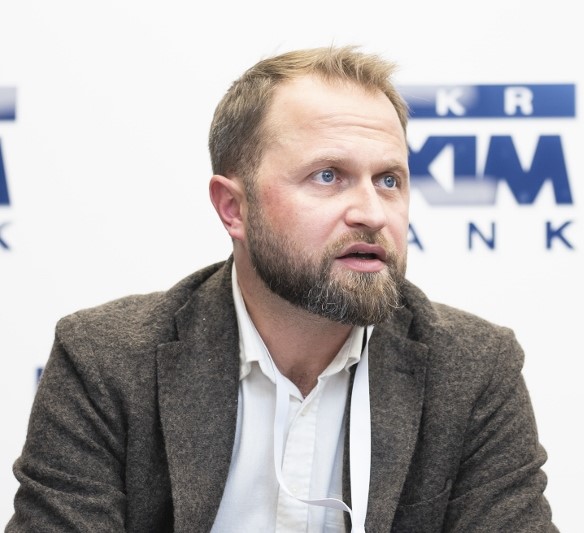AUB News
Ukraine's financial markets: conditions for recovery during the war
The war in Ukraine has caused significant damage to the country's financial system. However, despite this, Ukraine's financial markets are gradually recovering. This is evidenced by the results of the round table “Financial Markets in Time of War” held on November 9, 2023 in Kyiv at the initiative of the Association of Ukrainian Banks and JSC Ukreximbank.
 Banks retain high liquidity
Banks retain high liquidity
Discussing important topics ranging from current market conditions to forecasts for 2024, the roundtable participants expressed their views and provided suggestions for overcoming the challenges facing Ukraine's financial system. Anton Boldyrev, Director of Treasury and Investment Services at JSC Ukreximbank, in his speech noted that the NBU's monetary policy is effective and meets the existing risks. He emphasized that the banking system successfully maintains high liquidity, and international financial assistance is defined as a key factor in the stability of the banking system.

Mr. Boldyrev also said that the NBU's policy of gradually reducing the key policy rate is aimed at channeling bank liquidity into the real economy. Noting the market dynamics, he said that since the beginning of the full-scale invasion, the system's liquidity has increased from UAH 85 billion to UAH 650 billion amid active budget spending.
Mr. Sergiy also emphasized that investments in certificates of deposit have increased from UAH 120 billion to UAH 486 billion, which indicates the active development of this area. Noting the success of loan refinancing, Boldyrev said that in the first 10 months of the year, banks have repaid UAH 36 billion on refinancing loans, and since the beginning of 2022, this amount has amounted to UAH 158 billion.
Speaking about strategic steps, the director pointed to an increase in the mandatory reserve requirement from UAH 50 billion to UAH 330 billion and the introduction of “reserve” government bonds, which absorb UAH 200 billion of the system's liquidity. Emphasizing the positive developments, he said that since the beginning of 2022, the net assets of the Ukrainian banking system in national currency have increased by 25%, or almost UAH 400 billion.
Boldyrev spoke about the main areas of placement of these funds, emphasizing that certificates of deposit, government bonds and balances on correspondent accounts and cash desks account for 2/3 of the banking system's assets. He emphasized that the loan portfolio has decreased by UAH 90 billion, and in the structure of assets it has significantly decreased from 37% to 24%, and the main area of lending is government programs.
Emphasizing the effectiveness of government programs, Boldyrev said that during the martial law period, the “5-7-9%” program provided funds for more than UAH 155 billion, or 90% of new loans.
Boldyrev also said that financial aid inflows since the beginning of the full-scale war have amounted to more than $66 billion. This is a key source of maintaining exchange rate stability and stabilizing the financial market. He emphasized that this allowed to increase international reserves from USD 28 billion to a record USD 42 billion. to a record $42 billion. THE NATIONAL BANK OF UKRAINE HAS INCREASED ITS INTERNATIONAL RESERVES FROM USD 28 BILLION TO A RECORD USD 42 BILLION. Boldyrev also said that thanks to this financial assistance, it was possible to avoid the devaluation of the hryvnia in 2023 and reduce the spread between the cash and official exchange rates to less than 5%.
The director of the Treasury and Investment Services Department also predicts that another USD 10 billion will be credited by the end of the year. The Director of the Treasury and Investment Services Department also predicts another USD 10 billion in financial support by the end of the year, providing additional impetus to maintain stability in the face of the military conflict. According to Mr. Boldyrev, the National Bank of Ukraine's transition to a regime of managed exchange rate flexibility is a tool for adapting to changes in international financial markets and economic challenges.
Loans are declining, deposits remain attractive
Anton Kovalenko, Head of Capital Markets at PrivatBank, in his speech at the round table “Financial Markets in Time of War”, highlighted the impact of the NBU's monetary policy on the financial activities of banks, key trends and aspects that shape the financial landscape under martial law.
Noting the prudence of the National Bank of Ukraine's (NBU) monetary policy, Kovalenko noted that a reduction in the key policy rate would be reflected in lower yields on government securities, which are currently a key source of profit for banks. According to Anton Kovalenko, the reduction in the NBU's discount rate is accompanied by a decrease in bank loan rates - banks are already offering loans at 14%. This indicates a general downward trend in interest rates and a possible impact on the lending market.

Kovalenko also noted that some banks have already started lending to the corporate sector at rates lower than government securities. This indicates competitive dynamics and strategic changes in the banking sector. In his forecasts, Kovalenko expressed confidence that we can expect lower interest rates on loans in the near future. However, given the NBU's rhetoric aimed at maintaining the attractiveness of deposits, he pointed out that interest rates on deposits may decline less quickly than on loans.
An important topic of the speech was the dominance of government securities (government bonds) in the financial market, which, according to Kovalenko, has somewhat pushed the corporate sector out of the financial market. This can have important consequences for business and reflect strategic shifts in banks' investment planning.
Domestic government bonds are a stable investment instrument
In his speech at the roundtable “Financial Markets in Time of War”, Oleg Klimas, Head of Capital Markets at Raiffeisen Bank, emphasized the key aspect of the attractiveness of the domestic debt market of Ukraine and the peculiarities of its dynamics in the context of the military conflict.
According to Oleg Klimas, domestic government bonds remain an attractive investment instrument for both legal entities and individuals. This is due to the absence of taxation of domestic government bonds and a higher interest rate compared to bank deposits. Noting the absence of taxation of domestic government bonds, Klimas emphasized that this aspect makes these securities more attractive for individuals, who can receive income without further fiscal losses. Additionally, the high interest rate on domestic government bonds compared to bank deposit rates makes them more profitable for investors.

Oleg Klimas also emphasized the flexibility provided by the possibility of selling government bonds on the market at any time. The difference between this instrument and deposits is that domestic government bonds can be easily sold, receiving not only a return on investment but also the opportunity to earn additional money. He emphasized that even in the face of declining rates, government bonds remain attractive.
According to the expert, in the context of instability and military conflict, government bonds are becoming a more attractive and safe choice for the population, providing an opportunity to receive income without tax burdens and ensuring easy access to their own funds.
Klimas also pointed to a positive trend in the growth of the share of domestic government bonds among individuals, noting that the portfolio of individuals currently amounts to about UAH 50 billion, which is a historical maximum.
According to the expert, banks have also increased their portfolios of domestic government bonds. Today, the NBU and state-owned banks own more than 75% of the total portfolio of domestic government bonds. Oleg Klimas noted that the risk of domestic debt restructuring is minimal, as the Ministry of Finance refinances more than 100% of its debt.
The participants of the roundtable agreed that the domestic debt market is an important source of financing for Ukraine, and its development can help reduce the country's financial vulnerability. Despite the war, Ukraine managed to keep the market functioning and refinance its domestic debt repayments. This allowed the market to play an important role in meeting Ukraine's financial needs during the war and stabilizing the banking sector.
War risk insurance is a booster for the economy
In times of war, there is no full-fledged market for corporate and municipal bonds; it is rather a series of individual transactions than a full-fledged market. This opinion was expressed during the round table by Ruslan Kilmukhametov, Head of Debt Issuance at ICU Group.
According to the expert, today there are some business entities that use such instruments as corporate or municipal bonds to finance their activities. These are mainly non-depository credit institutions, most of which are microfinance and leasing companies, which are unable to attract deposits, so they are forced to turn to another part of the financial segment, where they take financing for their lending activities.
Ruslan Kilmukhametov noted that although this market is not very active, corporate securities should be issued whenever possible, as it is an opportunity to raise funding for current activities. He also noted that expectations for economic growth in the business environment are low - today, businesses do not forecast economic growth by 10, 20, or 30%. Therefore, since entrepreneurs do not see any prospects for economic growth, they refrain from bank loans.

Mr. Kilmukhametov emphasized that the banking system is not designed to take on war-related risks, but rather to manage commercial risks. At the same time, he suggested that war risk insurance could be a key factor for the development of the banking sector and the Ukrainian economy.
According to the speaker, some insurance companies already offer war risk insurance, which opens up the possibility of reducing overall financial risks and accelerating the development of the corporate bond market. Mr. Kilmukhametov emphasized the importance of assessing the cost of risks and identifying the entity that will take the ultimate risk. He believes that this can become a powerful booster catalyst for Ukraine's economy, attracting investment and contributing to the stability of the financial sector. In conclusion, Ruslan Kilmukhametov expressed his belief that risk assessment and developed war risk insurance can define new directions in the corporate bond market, contributing to its development even under martial law.
Challenges and risks - 2024
The duration of hostilities and their consequences remain a key risk for the next year. This was stated by Anton Boldyrev, Director of the Treasury and Investment Services Department of JSC Ukreximbank, speaking about the challenges and risks facing financial markets in 2024.
The speaker emphasized that current official expectations take into account the presence of significant security risks by the end of 2024. Therefore, the National Bank of Ukraine will be forced to maintain relatively tight monetary conditions amid significant uncertainty. The regulator's baseline scenario assumes that inflation will remain above the target range, which limits the room for easing interest rate policy.
The top manager of Ukreximbank also emphasized that a loose fiscal policy is one of the main drivers of economic recovery in the context of the military conflict. According to Boldyrev, external revenues are expected to reach USD 39 billion in 2024, and the US will be able to finance about 48% of budget expenditures, or UAH 3.3 trillion.
The expert also said that threats to the stable and safe export of domestic agricultural products by sea and land remain high, and there is a high risk of destruction of energy infrastructure and logistics centers.
In conclusion, Boldyrev emphasized the positive trends in the economy and financial sector, noting that despite the war, the economy is functioning and growing, but that the existing challenges and risks require prudent management of the financial and banking sector of Ukraine.
Andriy Dubas, President of the Association of Ukrainian Banks, who moderated the roundtable, noted that the banking system remains stable today due to three main factors: the prudent monetary policy of the National Bank, external financial assistance and effective bank management. He noted that the banking system faced the outbreak of a full-scale war in a much stronger position than it was in 2014. This was facilitated by the NBU's effective policy aimed at increasing its liquidity, capitalization, and reducing risks.

Dubas also commented on the criticism in the media directed at the NBU and Ukrainian banks. He emphasized that in this context, it is important to take into account the peculiarities and exceptional nature of the measures taken by the NBU management and bank management under martial law. Criticism based on the criteria, assessments and approaches inherent in peacetime is unfair today, as the NBU and banks' policies are now aimed at crisis management during the war, requiring in-depth analysis and sometimes non-standard solutions.
According to the President of the UBA, criticizing banks for maintaining liquidity, being solvent and having stable profitability during a full-scale war is absolutely unconstructive. The sharp increase in the key policy rate by the regulator, which caused an increase in the yield of government securities, which was used by banks to maintain their stability, are all situational measures caused by a full-scale war. According to Andriy Dubas, when talking about record profits of banks in 2023, we should not forget about the large taxes paid by banks in 2022-23, and most importantly, that today, despite the huge military risks, banks are operating steadily, the banking sector is strong and transparent.
The roundtable participants noted that Ukraine's financial markets have demonstrated considerable resilience. The banking system remains stable, and the volume of international financial assistance helps to maintain macroeconomic stability. However, according to them, Ukraine's financial system still faces serious challenges, the main ones being the continuation of the war and a possible reduction in international financial assistance. That is why today it is necessary to focus all efforts on economic recovery, intensification of business lending, and search for effective instruments to insure military risks.






Subscribe to our newsletter

Contacts
15, Yevhena Sverstyuka str.,
Kyiv, 02002 Ukraine
Email :
office@aub.org.ua
Phones:
+380 (44) 516-8775
